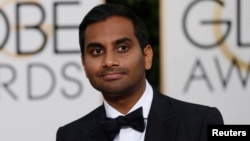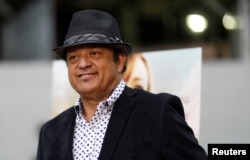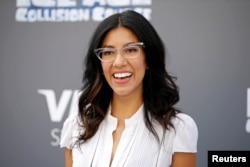When cameras pan across the faces of anxious Emmy Award nominees at Sunday's ceremony, TV viewers will see a record 12 African-Americans vying for comedy and drama series acting honors. But it's a lop-sided outcome in the struggle for diversity.
Master of None star Aziz Ansari, who is of Indian heritage, is the sole Asian-American to be nominated for a continuing series lead or supporting role. Not a single Latino is included in the marquee acting categories.
An Emmy version of the 2015-16 #OscarsSoWhite protests would miss the point: Worthy films and performances from people of color were snubbed by movie academy voters, while insiders say the scant Emmy love for non-black minorities largely reflects closed TV industry doors.
"There are a lot of us, but because we haven't gotten the opportunity to shine, you don't know we're around," said Ren Hanami, an Asian-American actress who's worked steadily in TV in smaller roles but found substantive, award-worthy parts elusive.
The hard-won progress made by the African-American stars and makers of Emmy-nominated shows including Black-ish and Atlanta has brought them creative influence, visibility and, this year, nearly a quarter (23.5 percent) of series cast nominations.
While that success is cheered by other ethnic groups, they say it illuminates how narrowly the entertainment industry views diversity despite the fact that Latinos and Asian-Americans are America's first- and third-largest ethnic groups, respectively.
Failure assumed
"TV has never been brown-ish," said actor-comedian Paul Rodriguez, riffing on the title of the hit African-American family comedy. He starred in the 1984-85 sitcom a.k.a. Pablo, one of the handful of short-lived, Hispanic-centered series, and wrote The Pitch, or How to Pitch a Latino Sitcom that Will Never Air, a 2015 stage show he's reprising this month in Los Angeles because, he said, little has changed for Hispanics.
"They don't put us on television enough for them to even know if it's not working," Rodriguez said. "They just assume it won't work. And it goes on year after year. Our population keeps growing, and so does our frustration."
That frustration is at critical mass, said Alex Nogales, president of the National Hispanic Media Coalition, which has for years pushed for more diversity on television.
"I'm tired of being the nice Mexican. It hasn't taken us anywhere," Nogales said. His new plan: Make sure networks and digital platforms such as Netflix know when Latinos — who have an estimated buying power of about $1.5 trillion and growing — are unhappy with their shows.
"Networks have brands that have been around for a very long time. We can damage that brand. We can do it by marching in front of their offices and embarrassing them. We can do it through social media," Nogales said.
The financial bottom line is key, agreed Gary Mayeda, president of the Japanese American Citizens League that was established in 1929 and focuses on civil rights issues affecting Asian and Pacific Islander Americans and others.
"Diversity is profitable," Mayeda said. "Cultural diversity takes nothing nor steals from any other group."
He called for more and better market research about consumers, a point Rodriguez drives home in his play Pitch. In one scene, a network executive character uses a pie chart that purports to show why Latinos are a loser for TV: They don't watch enough TV.
'Look a little further'
Dispelling stereotypes and tired assumptions is familiar to Tiffany Smith-Anoa'i, CBS executive vice president for entertainment diversity, a department she created in 2009.
"I'm always saying diversity doesn't mean black, it means so much more," Smith-Anoa'i said. She's used to encountering the industry attitude that casting one minority means the search is over.
" 'Have your eyes look a little further,' " she advises producers. "It might take three phone calls to find an actor, writer or director [of color] instead of the two that you're used to. But it definitely is worth it when you're looking for real authenticity and fresh voices, and you get it."
Brooklyn Nine-Nine actress Stephanie Beatriz knows what can happen when those with power are part of the solution.
The sitcom's creators, Daniel J. Goor and Michael Schur, assembled people whose stories aren't part of their own experience, she said, "but they want to help tell them. As straight white men, they are the strongest allies that underrepresented groups could ever have."
Established actors of color and others with clout also are taking matters into their own hands. African-Americans are well into the ownership game — music star John Legend's projects include the TV series Underground, Laurence Fishburne is a producer on Black-ish — and, increasingly, they're not alone.
Daniel Dae Kim (Lost, Hawaii Five-0) started 3AD, a film and production company whose projects include The Good Doctor, a fall drama for ABC about a young surgeon (Freddie Highmore) with autism and savant syndrome. The company has nine other projects in active development, Kim said, aimed at representing the range of the human condition, ethnic and otherwise.
"It's a conscious effort on my part, because this is the world that I'd like to see reflected," said the Korean-born actor, who came to America as a child. "If my company can help be one color in the spectrum of the diversity of entertainment, then that's the place I would like to hold."






